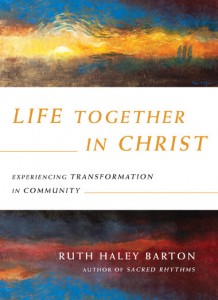
Q&A with Ruth About New Book Life Together in Christ

Why are community and spiritual transformation two of the most over-promised and under-delivered aspects of the church today?
Ruth Haley Barton: When I hear people speak in glowing terms about their vision for community, I have my doubts. When they tell me about painful things that have happened to them in community, I am never surprised. How many of us have joined a church or some other kind of spiritually-minded group in hopes of experiencing real care, connection and belonging, only to be disappointed? How often have we sat through inspiring sermons about what is possible when Christians gather together in mutually edifying relationships, only to recognize how cynical we have become after many failed attempts? Whether it’s an overtly religious group or not, there is something about human beings trying to get together and function together over the long haul that is just plain difficult.
I have made the disheartening discovery that it is possible to hang around other Christians a lot, meet regularly for worship, study our Bibles, join a church and even call ourselves a community but not change at all in ways that count. Talk about an inconvenient truth!
What is spiritual transformation?
Ruth: Spiritual transformation is the process by which Christ is formed in us—for the glory of God, for the abundance of our own lives and for the sake of others; it results in an increasing capacity to discern and do the will of God.
How does spiritual transformation take place?
Ruth: Spiritual transformation takes place incrementally over time, with others, in the context of disciplines and practices that open us to God. In general, while we are still on this earth, our transformation will happen by degrees (2 Corinthians 3:18), and we need each other in order to grow (1 Corinthians 12).
Even though we cannot transform ourselves, we can create the conditions in which spiritual transformation takes place. That is where spiritual disciplines come in. Spiritual disciplines are concrete activities we can engage in for the purpose of making ourselves available to God for the work that only God can do. Some of those disciplines take place as we are alone with God in solitude. Others take place in community with other Christ-followers—which is the topic of this book. And still others take place in the world beyond the community as we share our faith, serve the poor, show compassion, work for justice and seek reconciliation. These disciplines or practices are what Paul was referring to when he appealed to the Christians in Rome to “present your bodies as a living sacrifice, holy and acceptable to God, which is your spiritual worship” (Romans 12:1). He was simply talking about finding ways to surrender to God in every aspect of life—not just in theory but in reality. Participating intentionally and meaningfully in transforming community is one of those ways.
Why is it important to bring community and spiritual transformation together?
Ruth: It is the lack of spiritual transformation within individuals and systems that causes communities to falter and sometimes implode or explode. And it is the lack of community—a privatized approach to transformation that fails to see other people as necessary instruments of God’s grace—that limits the work of transformation in our lives. If we can bring these two dynamics together in transforming community, a spontaneous combustion will begin to take place.
How does Life Together in Christ bring the aspects of community and  transformation together?
transformation together?
Ruth: Becoming a transforming community involves having real guidance in the attitudes, practices and behaviors that open us to the transforming presence of Christ in our midst. And that’s where a book like this comes in. Life Together in Christ is an interactive guide for small groups of people who are ready to get personal and practical about experiencing transformation together.
How do groups begin to take this step toward real spiritual transformation together in community?
Ruth: To start, reflect together on the opening illustrations and comments on “the most over-promised, under-delivered” aspects of the church today. Do you agree? Disagree? What have your past experiences of community and spiritual transformation been? How have these experiences affected you?
Do you ever let yourself imagine what it might be like to be part of a transforming community? What would you give to experience that, or does it not matter to you right now? Is there any way in which you have given up?
How do you respond to the statement that “spiritual transformation is central to the message of the gospel and therefore central to the mission of the church”? Do you agree? Disagree? How does this motivate you (or not) to participate in a transforming community?
View the table of contents, read endorsements and download an excerpt by visiting lifetogetherinchrist.com
Purchase A signed copy in The Transforming Resources online store
• Order from Amazon by clicking here.
• Order for your Kindle by clicking here.
• Order from InterVarsity Press
©Ruth Haley Barton, 2014. Ruth Haley Barton (Doctor of Divinity, Northern Baptist Seminary) is founder of the Transforming Center. A teacher, spiritual director and retreat leader, she is the author of numerous books and resources on the spiritual life including Pursuing God’s Will Together, Strengthening the Soul of Your Leadership, Sacred Rhythms, and Invitation to Solitude and Silence.
The purpose of the Beyond Words blog is to offer helpful and hopeful content and conversation that strengthens the souls of leaders and the congregations and communities they serve. All comments are monitored and the TC reserves the right to delete those that are not consistent with this goal and purpose. Access our comments policy.
Join thousands of pastors and spiritual leaders
Receive Beyond Words®, reflections on the soul of leadership. Written by Ruth Haley Barton, each reflection provides spiritual guidance and encouragement for those seeking to be in God for the world.
